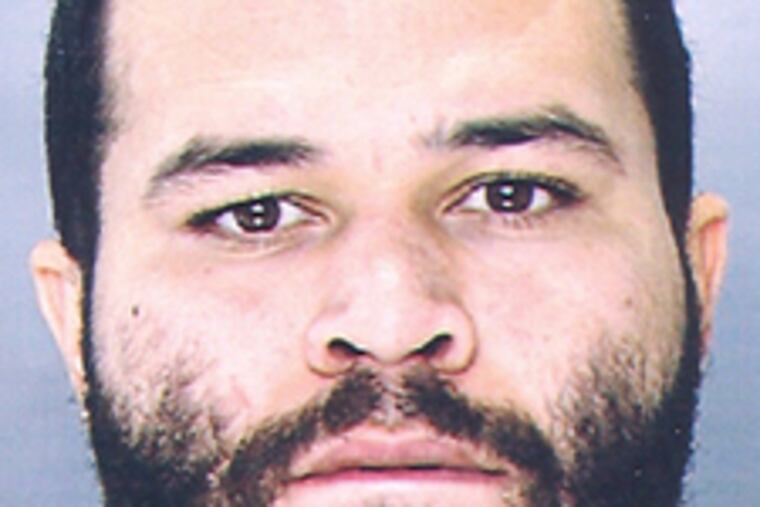Prison slaying raises questions of inmate housing
Joshua David Herder is an accused murderer with a long history of severe mental illness who once stormed a church wielding a knife and later crashed a funeral at the same church, where police tackled him on the altar in front of astonished mourners.

Joshua David Herder is an accused murderer with a long history of severe mental illness who once stormed a church wielding a knife and later crashed a funeral at the same church, where police tackled him on the altar in front of astonished mourners.
Charles E. Kirkland was a career burglar and occasional drug offender sent back to jail in October after a probation violation.
Last Friday, their fates collided when Herder allegedly strangled Kirkland in their shared prison cell, raising questions about how city corrections officials place inmates in a troubled system long plagued by overcrowding and deplorable conditions.
"Assuming [Herder] was a person with a serious psychiatric background and a background of convictions for violent offenses, it appears at least questionable for him to be housed with someone there on a probation violation," said David Rudovsky, a civil-rights lawyer who has sued the city before over prison conditions.
"Some hard questions ought to be asked about the classification system in place, and whether this was something permitted by the system and a deviation that shouldn't have happened, and whether overcrowding had some impact on this decision," Rudovsky added.
Prisons Commissioner Leon King agreed that placing Herder and Kirkland together was "troubling" and has launched an investigation.
"I still have not gotten to the bottom of how these two were classified together. Looking at it just as you, that's troubling to me," King said.
Just before 8 p.m. Friday, the sole prison guard on duty in the transitional behavioral-health housing unit at the Philadelphia Industrial Correctional Complex found Kirkland, 47, dead on the floor of his cell, prisons spokesman Bob Eskind said.
Inside the cell with him was inmate Herder, 25.
The medical examiner's office determined that Kirkland had been strangled, and Herder was charged with murder on Sunday.
The 80 inmates in 50 cells on the unit are supposed to be guarded by two guards, but the other guard was on a dinner break, Eskind said. Eskind was unaware whether the unit's sole guard heard any commotion.
"The officer making a round saw the body on the floor and that's how Mr. Kirkland was found," Eskind said.
Kirkland, of Germantown Avenue near Berkley Street, was behind bars for violating his probation from a 2003 case, in which he was convicted of criminal trespass and sentenced to two to four years, according to court records. For the probation violation, he was serving a sentence of 11 to 23 months.
Herder was there in connection with an Oct. 17 homicide, in which he's accused of stabbing Robert Kitchen, 68, twice in the chest after an argument in the halfway house for mentally challenged men where both lived.
Herder, of Sellersville, has an extensive criminal history in Bucks County, most notably for forcing his way at knifepoint into St. Isidore's Church in Quakertown. There, he fruitlessly demanded to speak to the cardinal. He also confided to the police chief who later talked him into surrendering that he'd hoped to force police to fatally shoot him in the church so that he could join God, according to news reports of the March 2002 incident.
The following day at Sellersville's Grand View Hospital, where he'd been admitted as a psychiatric patient, he punched an orderly, fled, stole an ambulance and led pursuing police on a low-speed chase before leaping from the still-rolling ambulance outside St. Isidore's, according to news reports.
Herder burst into the church, interrupting a funeral, and charged the altar, where he was tackled by police as stunned mourners looked on.
For those incidents, Herder was sentenced to 11 to 23 months in prison and ordered to stay out of Quakertown and undergo anger-management counseling, according to court records.
Kirkland's death was the first homicide in the city prison system this year, Eskind said. Seventeen inmates have died in city prisons so far this year - one suicide, Kirkland's homicide and the others medically related - compared to 21 for all of last year, Eskind added.
Eskind defended Kirkland's placement with Herder, saying intake workers had not been aware of Herder's criminal troubles in Bucks County.
City prison-intake workers handle 80 to 100 new inmates daily and don't have time to do extensive criminal histories on each one, Eskind said. Intake workers do, however, examine everything from known criminal history and past incarceration to employment and church attendance when deciding where to place inmates, he added.
Mental-health and other medical issues typically trump other concerns in placement decisions, King said. But even risky inmates aren't guaranteed solo cells, he added. "Generally speaking, we do not have the room or the luxury to single-cell people," Prisons Commissioner King said.
Added Eskind: "There were no alerts on this guy [Herder]."
Bill DiMascio, executive director of the Pennsylvania Prison Society, was reluctant to cast blame.
"Somebody's dead, and obviously it raises a concern, but it would be severe Monday-morning quarterbacking at this point" to judge whether Herder and Kirkland should have been placed together, DiMascio said.
"They process thousands of people in the city prison system. Generally speaking, the way they handle those folks is fine and works well in most cases, but every once in a while, you have a horrendous occurrence like this," he added.
Kirkland's relatives could not be located for comment.